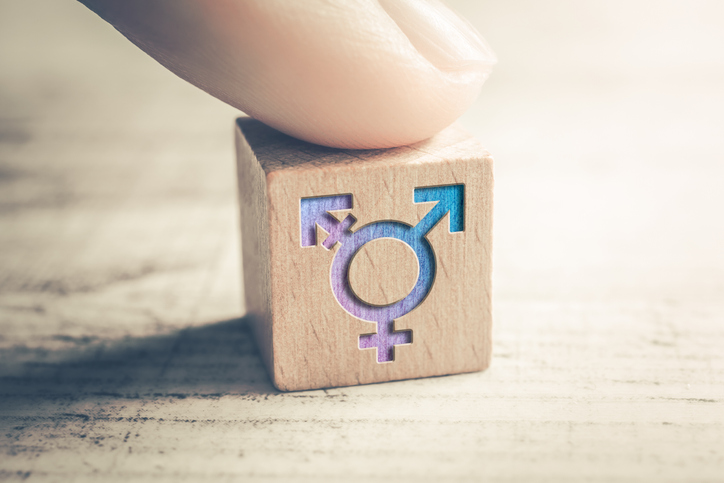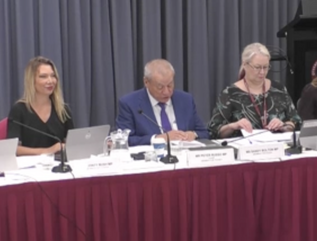
A Queensland parliamentary enquiry has wrapped up two days of hearings on legislation that will enable people to change the sex recorded on their birth certificate without undergoing medical procedures.
Under the legislation, anyone aged 16 and up can apply to change the sex on their birth certificate with just a statutory declaration and a supporting statement.

The Legal Affairs and Safety Committee is scheduled to report on the government’s Births, Deaths and Marriages Registration Bill on February 24.
The legislation reflects the belief that people are born neither male nor female, but instead have an inherent gender identity that doesn’t have anything to do with anatomy.
The state government says the legislation will modernise birth certificates and better recognise the state’s diverse community, which includes trans and non-binary identifying people.
Advocates for the bill told the committee that having their biological sex on a birth certificate is traumatic for trans people and their families and can lead to self-harm.
However, the committee also heard being able to legally change your sex is unscientific, has the potential to undermine the rights and safety of women and girls, and will create legal complexities.
Changing birth certificates
Under the new legislation, people who identify as trans and gender diverse (including sex descriptors such as ‘genderqueer’, ‘agender’ and ‘nonbinary’) will be able to formally change the sex recorded on their birth certificates without undergoing surgery and medical interventions.
The legislation also establishes pathways – with parental support – for children between 12 and 16 to apply to the registrar of Births, Deaths and Marriages to change their recorded sex.
The Queensland government says the legislation will put Queensland in line with all other states and territories – apart from NSW and WA – that have removed the legislative requirement for sex reassignment surgery before changing the sex on their birth registration.
Social identities
Professor Patrick Parkinson, Emeritus Professor at the University of Queensland, told the committee the premise of the bill – that it’s possible to ‘born in the wrong body’ – isn’t supported by science.

“Apart from babies born with intersex conditions … babies are born either being boys or girls,” he said last Tuesday.
“This bill allows the gender identity to displace their sex as a matter of law and that, with respect, is madness.”
Professor Parkinson said trans and non-binary are social or psychological identities, not medical conditions.
“To say that you can change your sex on the basis of being genderqueer as opposed to saying, ‘I have an identity which is genderqueer’—those are two completely different things,” he said.
“The bill is premised on the idea that we are born in the wrong body, or people could be born in the wrong body. There is actually not much evidence for that.”
This bill allows the gender identity to displace their sex as a matter of law and that, with respect, is madness.
Professor Patrick Parkinson
If the bill was passed, a registered ‘non-binary’ teenager would be in law neither female
nor male, Professor Parkinson said. “What does that even mean from a legal perspective?” he asked the committee.
Human rights
Deputy Queensland Human rights Commissioner Neroli Holmes said allowing trans-identifying people to align their sex with their lived experience of gender upheld the rights of the Human Rights Commission and was supported by the QHRC.

“The bill delivers reforms which are essential to ensure the privacy, freedom of expression and equality before the law of people accessing Queensland’s birth registration system—in particular, trans and gender diverse people and diverse families including same-sex families or same-sex parent families,” she said.
Ensuring fair and equitable access for transgender and gender diverse people to change their record of sex upheld the right under the Human Rights Act to recognition, equality and privacy, she told the committee.
Legal entanglements
Queensland Law Society vice president Rebecca Fogerty said some members of the society’s legal policy committees had expressed concerns about the lack of certainty around how the framework would operate in practice.
This included implications for how invasive searches are carried out, and what it might mean for wills and estates, especially in relation to class gifts such as those that specify daughters, sons, nieces and nephews.
For example a son who was entitled to a gift as a son could also be entitled to a gift as a daughter after changing his sex descriptor.
Executive Director of Public Policy and Advocacy with Associated Christian Schools, Alistair Macpherson, said the primary concern with the bill related to how it would interact with the Anti-Discrimination Act’s exemption for single sex schools.
Asked if he thought the bill could prevent same-sex schools from making a decision about who enrolled at the school, he said that was a concern in the bill’s current form.
Administrative changes
Luke Twyford, CEO and Principle Commissioner with the Queensland Family and Child Commission, said the proposed changes in the bill were essentially administrative.

“They primarily relate to how a person is recorded in a database. It is about enabling a person to change their record of sex,” Mr Twyford told the committee.
He said a birth certificate was straightforward and easy for most people, but not for young transgender and gender diverse people.
“Young Queenslanders have told me that an incorrect sex marker on identifying documentation is a constant reminder of an identity that is not them. It raises fear – fear of prejudice, of violence, of bias and of having to explain their life situation to strangers.”
Erosion of women’s rights
But Rachael Wong from Women’s forum Australia said the bill would give biological males access to women’s spaces. As such, the legislation was in conflict of the rights of women to feel safe in women’s only spaces.

Society’s most vulnerable women would be worst affected by the proposed law, she said.
“Opposition to this bill is … a universal recognition of the importance of single-sex spaces and the risks that biological males can pose to women and girls,” Ms Wong said in her evidence.
“The rationale for why we have single-sex prisons, bathrooms, changing rooms, sports and so on is based on an understanding of the biological sex differences between men and women and the value placed on protecting and progressing women’s dignity, safety, fairness and equality.
“It enables any male to self-identify as a woman and access female-only spaces, services, sports, opportunities and even lesbian events, and undermines the very purpose of single-sex spaces.”
The change would also confound sex-based data collection and “opens up loopholes for predatory men to exploit the system and gain unfettered access to vulnerable women and girls,” she said.
Affirmation
Jeremy Wiggins CEO of the advocacy group Transcend said the current birth certificate system caused distress for trans identifying children and their family and put them at risk of being ‘outed’ as their biological sex.

Mr Wiggins said changing identity documents would allow young trans-identifying people to “simply live their lives”.
“The families that seek support from us, especially those based in Queensland, have expressed to me the critical importance of the law providing a more accessible and modern way to ensure identification documents reflect the identity of their trans children,” he said.
“It is highly important at this stage in a young person’s life that they feel nurtured, affirmed and accepted for who they are. Without a birth certificate listing the sex that aligns with their gender identity, it jeopardises their safety and privacy.”
The bill, which was introduced last December, has received more than 370 submissions.
The Committee is scheduled to table its report on February 24.
Comment below to have your say on this story.
If you have a news story or tip-off, get in touch at editorial@governmentnews.com.au.
Sign up to the Government News newsletter

In the above article Mr Wiggins said this legislation will prevent transgender people being outed by having to mark a box that doesn’t align with their assigned gender. I am sure that without most people would recognise a man with makeup in a dress or a woman dressed as a man without seeing a box . I am apposed to changing the original identified and assigned sex on a birth certificate as it scientifically can’t be disputed, even when a body has been surgically altered . But I am open to having another category placed on a birth certificate to reflect gender identity. This would then allow someone to identify as they wish, but for medical an legal reasons still allow continuity to trace the persons genetic history back to birth for forensic identification for example.
For God’s sake. Didn’t anyone listen to Professor Patrick Parkinson. Scotland just got rid of Nicola Sturgeon for exactly this self same madness. Where do women’s rights come in all of this?
My favourite part is where they only care about women and their rights, no argument about biological woman coming into men’s spaces, use that as an argument, at least make it unbiased or you’re a sexist. Also the old requirement meant only the wealthy could switch genders, who has 30k+ to spend on getting invasive surgery for fake genitals. As someone who passes on just HRT and doesn’t want an invasive surgery, I’m very happy this is happening.
I am transgender female & I am so happy the I will finally be able to change my birth certificate to female soon because I can’t afford the surgerys & if there are people out there who want us to get it then put it on Medicare benefits then.
I think the people who are against this coming in don’t know what they are talking about at all, because we are born with a female brain in wrong bodies ok. Please don’t listen to the group who are against it.
All good for transfolk. But don’t conflate a biological definition (female), with a gender indenty. The are two very different things and have major implications on society as a whole.